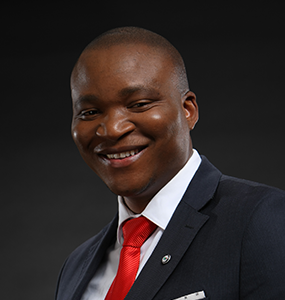Top Lottery exec to face new corruption inquiry
NLC serves its chief operating officer Phillemon Letwaba with a notice of intention to suspend him - for the third time
Not for the first time, National Lotteries Commission chief operating officer Phillemon Letwaba faces charges of corruption and contravening various financial acts. Photo copied for fair use from NLC website
-
Last week, National Lotteries Commission chief operating officer Phillemon Letwaba was served a letter of intention to suspend him.
-
A few months ago, a disciplinary hearing cleared him of corruption charges.
-
But a new NLC board is now bringing the same charges against him.
The new board of the National Lotteries Commission (NLC) has served chief operating officer Phillemon Letwaba with notice of their intention to suspend him. This notice, delivered last week, comes after an earlier internal inquiry cleared Letwaba of money laundering and abusing his position to enrich himself and his family.
Letwaba is expected to be suspended as early as this week. He was also informed that he would face the same four charges on which he was previously cleared. GroundUp also understands that new charges might be added.
An NLC source said that the new board had asked NLC Commissioner Thabang Mampana to suspend Letwaba, but said that she did not comply with their instructions. This apparently led the board to take the matter into its own hands.
This will be the third time that Letwaba has been suspended. In March 2020, he was forced to take a leave of absence on full pay. He returned to work around July 2021, having earned over R3-million during his 17-month absence. In October 2021, less than three months later, he was again suspended on full pay. He returned to work in March 2022, having earned close to R1.5-million during this absence. Just four months later, he has been sent another letter of intention to suspend him.
At the first disciplinary inquiry, Letwaba was accused of conflict of interest and using front companies to funnel money from non-profit companies that received Lottery grants.
Charges against him also included contraventions of the Prevention of Organised Crime Act, as well as sections of the Lotteries Act and the Public Finance Management Act. He pleaded not guilty to all charges.
GroundUp understands that Trade, Industry and Competition Minister Ebrahim Patel, who has oversight of the Lottery, as well as the NLC’s new board had concerns about how the first disciplinary inquiry was conducted.
Shortly after Letwaba was cleared of the charges, Special Investigating Unit (SIU) head Andy Mothibi told the Parliamentary Trade and Industry Portfolio Committee that he too had reservations about the way the disciplinary hearing was conducted.
“The SIU will study the outcome of the disciplinary hearing and will chart the way forward thereafter,” Mothibi told Parliament. He said the SIU had, so far, identified evidence that R300-million in Lottery grants had been misappropriated.
Lawyers acting for the new board, who scrutinised both the evidence and the outcome of the first inquiry, have spent weeks working on the new charge sheet.
The first disciplinary hearing was chaired by advocate Chris Erasmus and held at his Pretoria offices between 19 and 27 January this year. Only two witnesses were called – Letwaba and Humbulani Gideon Funyufunyu, a chief forensic investigator for the SIU.
Letwaba pleaded not guilty but admitted that some companies involving his family had been contracted as service providers on Lottery-funded projects. He argued that these companies had not benefited directly from Lottery funding and that the Lotteries Act did not preclude them from doing business with grant beneficiaries.
Letwaba was originally charged after Mothibi officially informed Commissioner Mampane in writing of evidence of misconduct by Letwaba.
Letwaba, he said, was guilty of misconduct or breach of trust by accepting financial benefits of around R45-million through multiple entities linked to his family. There was also evidence that Letwaba had been involved in conflicts of interest that contravened the Lotteries Act, he told Mampane.
In his ruling clearing Letwaba, Erasmus said that “there is no policy in place at the NLC” preventing relatives of its employees or entities controlled by them from conducting business “with any entity or entities that received funding” from the NLC.
Erasmus said that evidence by Funyufunyu was based on “assumptions” and would not “suffice”.
Erasmus said that much of Letwaba’s evidence was “left unchallenged” during his cross-examination, because counsel for the NLC “had no instruction or information at his disposal” to contradict Letwaba’s evidence.
However, recently some of the evidence presented by Funyufunyu’s at Letwaba’s disciplinary hearing was accepted by a Special Tribunal judge, when the court granted a preservation order involving a dodgy R19-million Lottery grant for an athletics track.
Support independent journalism
Donate using Payfast

Don't miss out on the latest news
We respect your privacy, and promise we won't spam you.
Next: Fire crew attacked responding to blaze where toddler died
Previous: South African engineers are trying to solve the global water crisis
© 2022 GroundUp. This article is licensed under a Creative Commons Attribution-NoDerivatives 4.0 International License.
You may republish this article, so long as you credit the authors and GroundUp, and do not change the text. Please include a link back to the original article.
We put an invisible pixel in the article so that we can count traffic to republishers. All analytics tools are solely on our servers. We do not give our logs to any third party. Logs are deleted after two weeks. We do not use any IP address identifying information except to count regional traffic. We are solely interested in counting hits, not tracking users. If you republish, please do not delete the invisible pixel.

